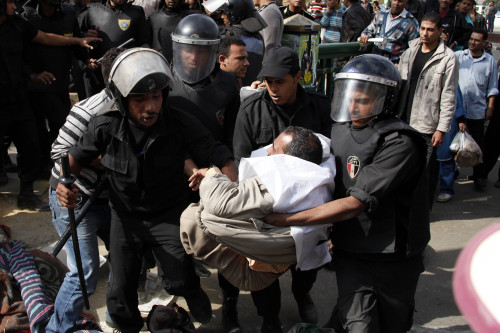CAIRO (AP) ― Egyptian riot police firing tear gas and rubber bullets stormed into Cairo’s Tahrir Square Saturday to dismantle a protest tent camp, setting off clashes that killed two protesters, injured hundreds and raised tensions days before the first elections since Hosni Mubarak’s ouster.
The scenes of protesters fighting with black-clad police forces were reminiscent of the 18-day uprising that forced an end to Mubarak’s rule in February. Hundreds of protesters fought back, hurling stones and setting an armored police vehicle ablaze.
The violence raised fears of new unrest surrounding the parliamentary elections that are due to begin on Nov. 28. Public anger has risen over the slow pace of reforms and apparent attempts by Egypt’s ruling generals to retain power over a future civilian government.
Witnesses said the clashes began when riot police dismantled a small tent camp set up to commemorate the hundreds of protesters killed in the uprising and attacked around 200 peaceful demonstrators who had camped in the square overnight in an attempt to restart a long-term sit-in there.
The scenes of protesters fighting with black-clad police forces were reminiscent of the 18-day uprising that forced an end to Mubarak’s rule in February. Hundreds of protesters fought back, hurling stones and setting an armored police vehicle ablaze.
The violence raised fears of new unrest surrounding the parliamentary elections that are due to begin on Nov. 28. Public anger has risen over the slow pace of reforms and apparent attempts by Egypt’s ruling generals to retain power over a future civilian government.
Witnesses said the clashes began when riot police dismantled a small tent camp set up to commemorate the hundreds of protesters killed in the uprising and attacked around 200 peaceful demonstrators who had camped in the square overnight in an attempt to restart a long-term sit-in there.

“Violence breeds violence,” said Sahar Abdel-Mohsen, an engineer who joined in the protest after a call went out on Twitter urging people to come to Tahrir to defend against the police attacks. “We are tired of this and we are not leaving the square.”
Police fired rubber bullets, tear gas and beat protesters with batons, clearing the square at one point and pushing the fighting into surrounding side streets of downtown Cairo.
A 23-year-old protester died from a gunshot, said Health Ministry official Mohammed el-Sherbeni. At least 676 people were injured, he said. At least one other protester was killed in Alexandria, where demonstrations and clashes also took place, said a security official, speaking on condition of anonymity because he was not authorized to talk to journalists.
Crowds swarmed an armored police truck, rocking it back and forth and setting it ablaze.
After nightfall, protesters swarmed back into the square in the thousands, setting tires ablaze in the street and filling the area with an acrid, black smoke screen. Police appeared to retreat to surrounding areas, leaving protesters free to retake and barricade themselves inside the square. The air was still thick with stinging tear gas.
Shortly before midnight, police pushed back toward the square, firing more tear gas and drawing a barrage of stones from the protesters holding the site.
The government urged protesters to clear the square.
A member of the military council, Gen. Mohsen el-Fangari, dismissed the protesters and said their calls for change ahead of the election were a threat to the state.
“What is the point of being in Tahrir?” he said, speaking by phone to the popular Al-Hayat TV channel. “What is the point of this strike, of the million marches? Aren’t there legal channels to pursue demands in a way that won’t impact Egypt ... internationally?”
“The aim of what is going on is to shake the backbone of the state, which is the armed forces.”
In a warning, he said, “If security is not applied, we will implement the rule of law. Anyone who does wrong will pay for it.”
Saturday’s confrontation was one of the few since the uprising to involve police forces, which have largely stayed in the background while the military takes charge of security. There was no military presence in and around the square on Saturday.
The black-clad police were a hated symbol of Mubarak’s regime.
“The people want to topple the regime,” shouted enraged crowds, reviving the chant from the early days of the uprising. Crowds also screamed: “Riot police are thugs and thieves” and “Down with the Marshal,” referring to Field Marshal Hussein Tantawi, Egypt’s military ruler.
Some of the wounded had blood streaming down their faces and many had to be carried out of the square by fellow protesters to waiting ambulances.
Human rights activists accused police of using excessive force.
-
Articles by Korea Herald




![[Music in drama] Rekindle a love that slipped through your fingers](http://res.heraldm.com/phpwas/restmb_idxmake.php?idx=644&simg=/content/image/2024/05/01/20240501050484_0.jpg&u=20240501151646)

![[New faces of Assembly] Architect behind ‘audacious initiative’ believes in denuclearized North Korea](http://res.heraldm.com/phpwas/restmb_idxmake.php?idx=644&simg=/content/image/2024/05/01/20240501050627_0.jpg&u=20240502093000)




![[KH Explains] Will alternative trading platform shake up Korean stock market?](http://res.heraldm.com/phpwas/restmb_idxmake.php?idx=644&simg=/content/image/2024/05/01/20240501050557_0.jpg&u=20240501161906)







![[Today’s K-pop] Stray Kids go gold in US with ‘Maniac’](http://res.heraldm.com/phpwas/restmb_idxmake.php?idx=642&simg=/content/image/2024/05/02/20240502050771_0.jpg&u=)